2011年《随堂优化训练》英语 新课标北师大版 必修5 unit 13 people warm-up & lesson 1 eq;iq [配套课件]
文档属性
| 名称 | 2011年《随堂优化训练》英语 新课标北师大版 必修5 unit 13 people warm-up & lesson 1 eq;iq [配套课件] |
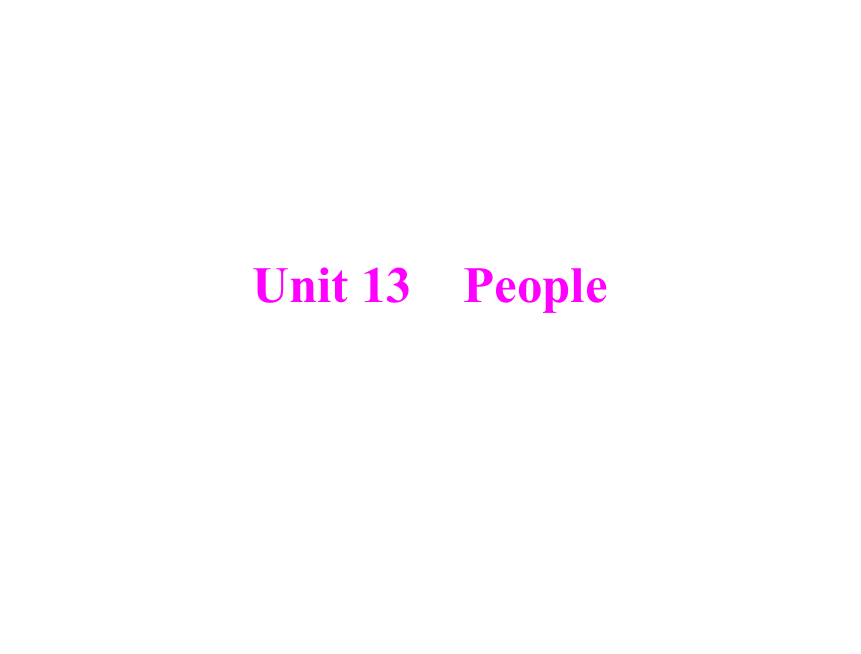
|
|
| 格式 | rar | ||
| 文件大小 | 296.9KB | ||
| 资源类型 | 教案 | ||
| 版本资源 | 北师大版 | ||
| 科目 | 英语 | ||
| 更新时间 | 2011-07-17 00:00:00 | ||
图片预览

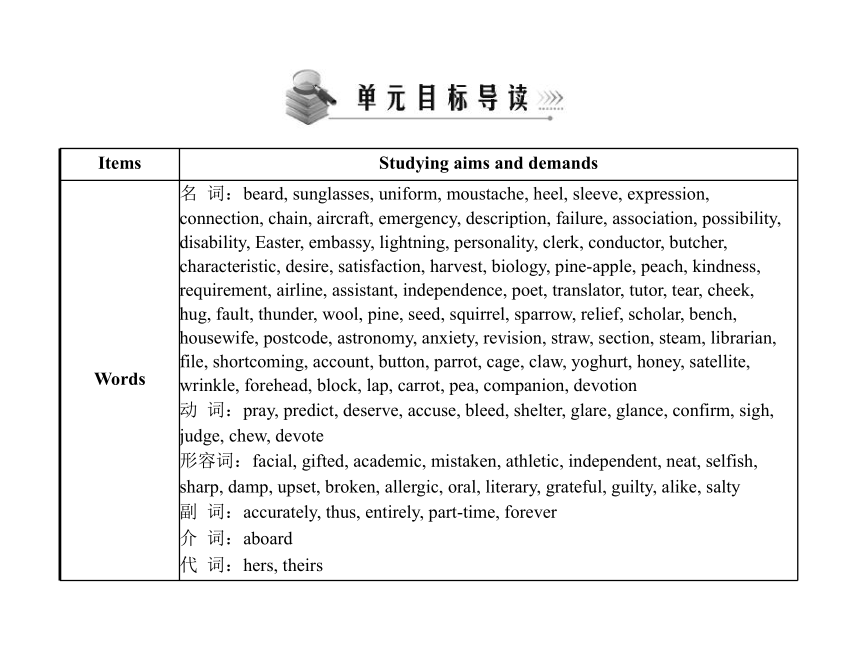
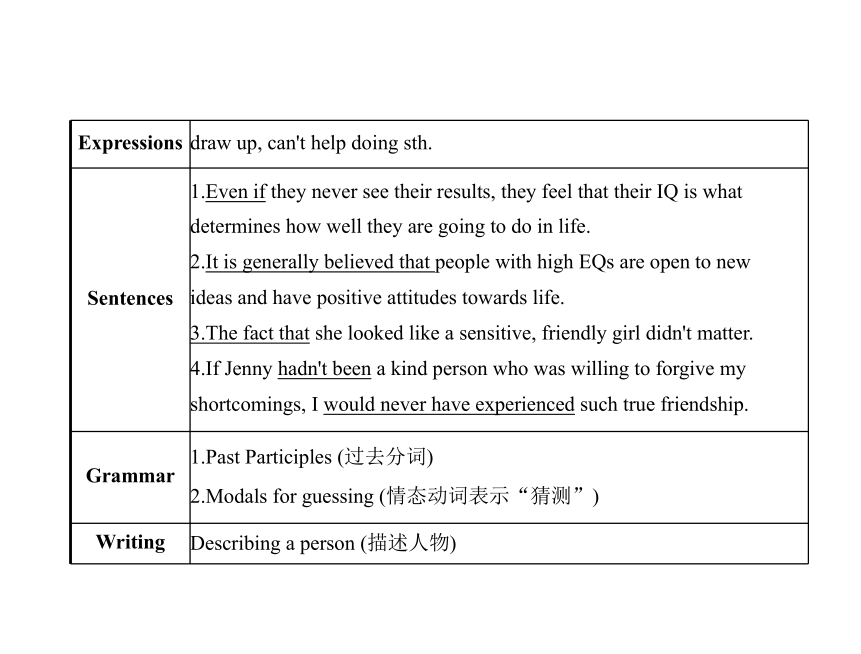
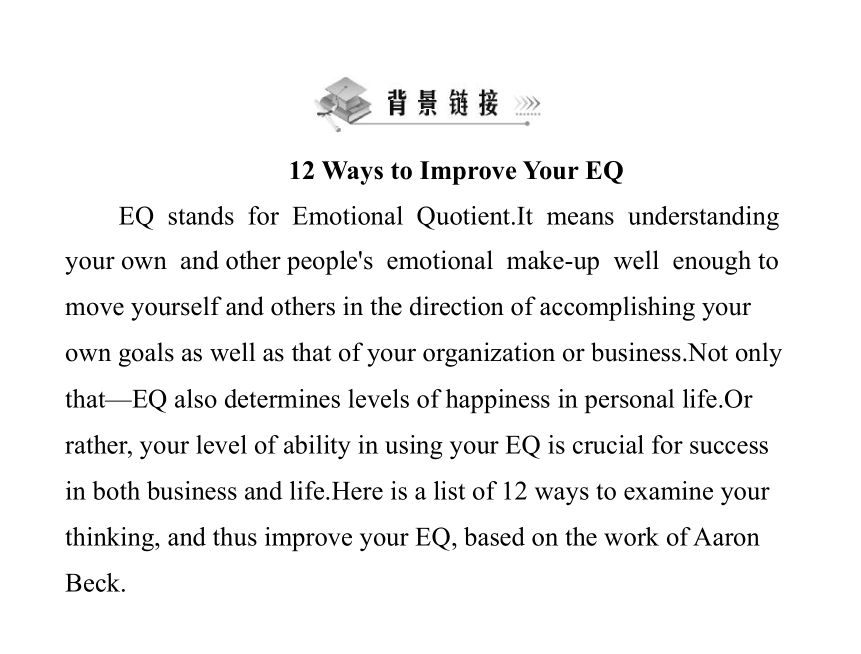
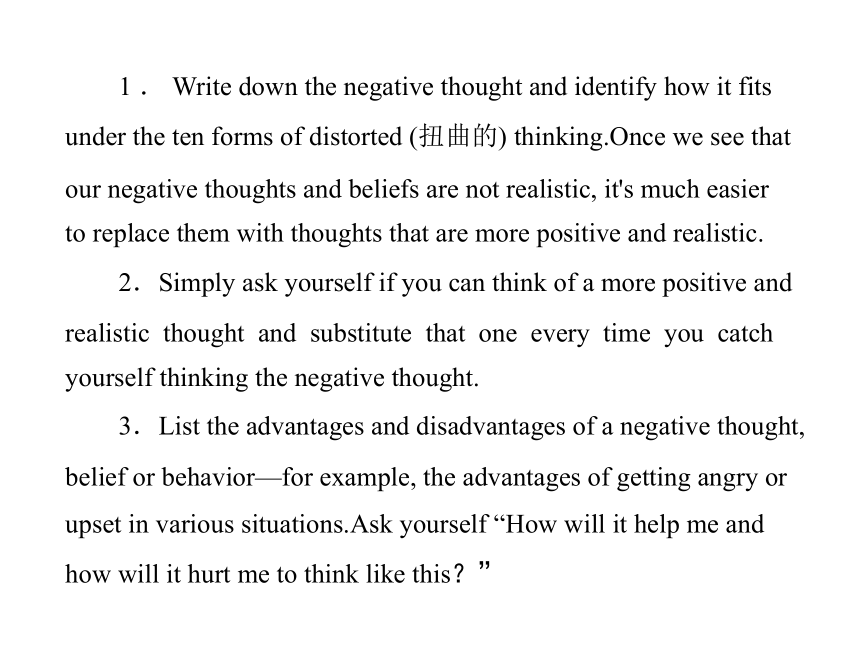
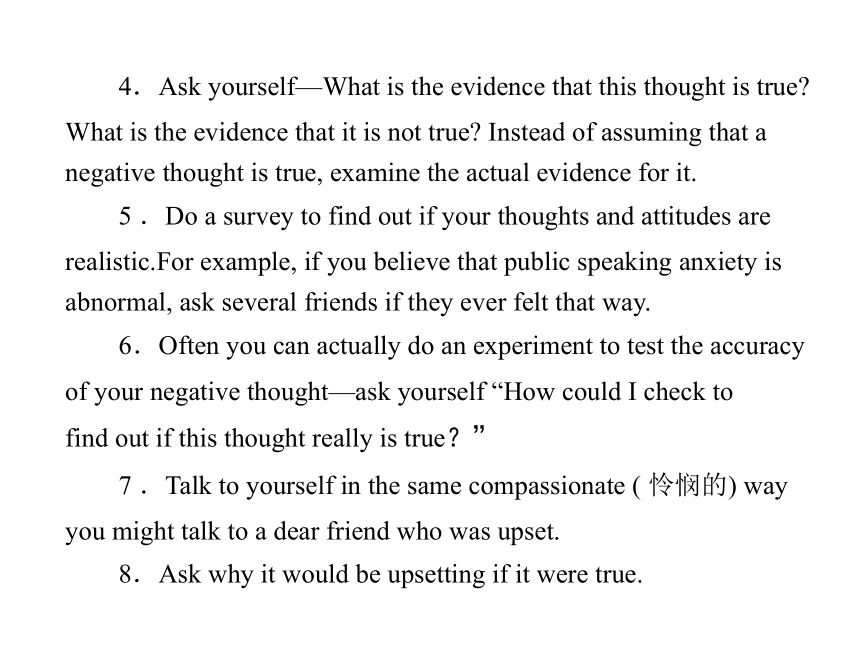
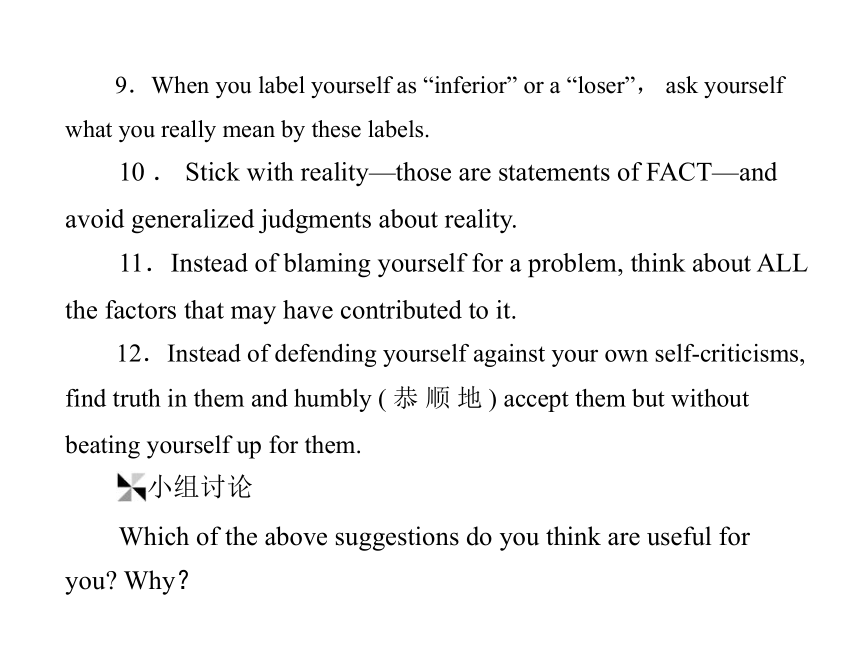

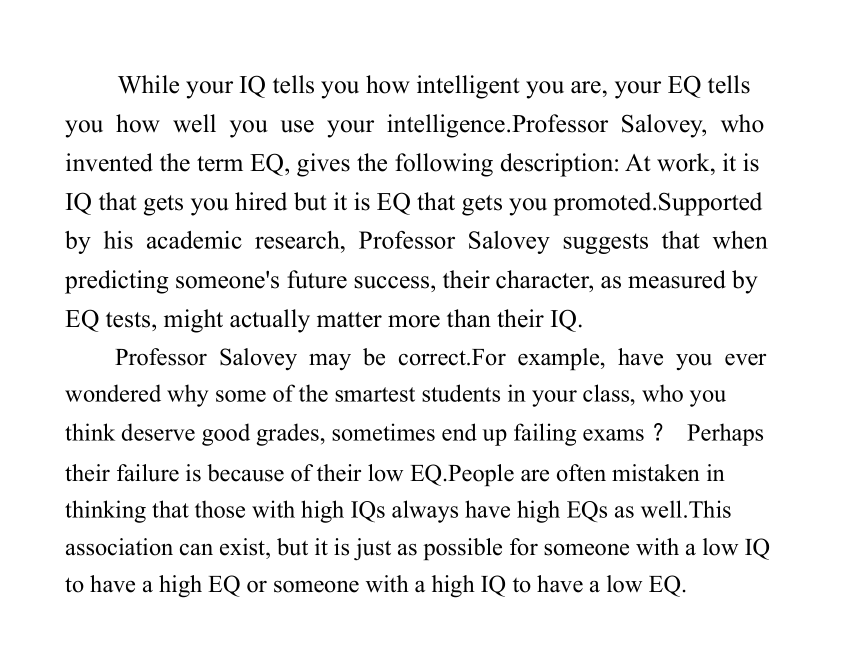

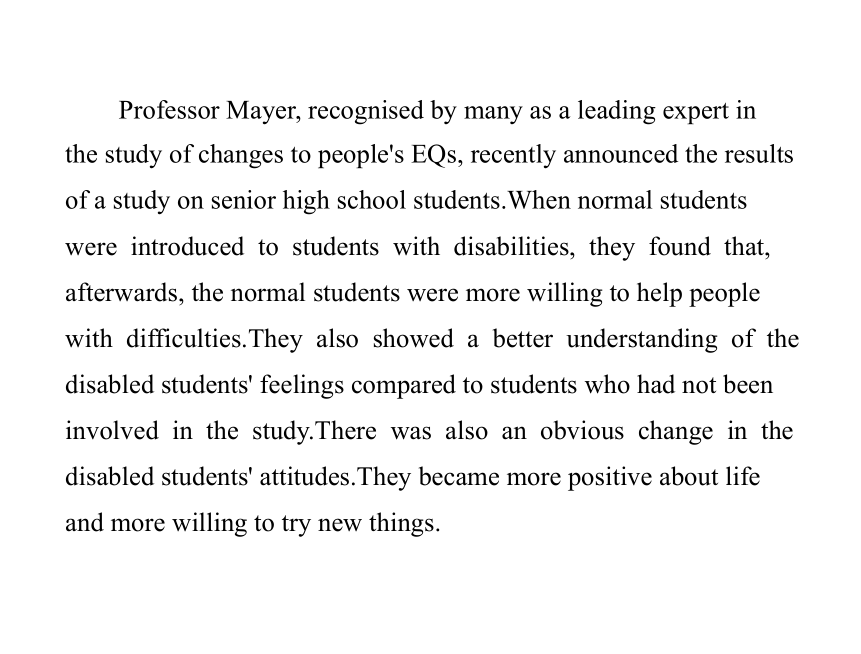

文档简介
(共65张PPT)
Unit 13 People
Items Studying aims and demands
Words 名 词:beard, sunglasses, uniform, moustache, heel, sleeve, expression,
connection, chain, aircraft, emergency, description, failure, association, possibility,
disability, Easter, embassy, lightning, personality, clerk, conductor, butcher,
characteristic, desire, satisfaction, harvest, biology, pine-apple, peach, kindness,
requirement, airline, assistant, independence, poet, translator, tutor, tear, cheek,
hug, fault, thunder, wool, pine, seed, squirrel, sparrow, relief, scholar, bench,
housewife, postcode, astronomy, anxiety, revision, straw, section, steam, librarian,
file, shortcoming, account, button, parrot, cage, claw, yoghurt, honey, satellite,
wrinkle, forehead, block, lap, carrot, pea, companion, devotion
动 词:pray, predict, deserve, accuse, bleed, shelter, glare, glance, confirm, sigh,
judge, chew, devote
形容词:facial, gifted, academic, mistaken, athletic, independent, neat, selfish,
sharp, damp, upset, broken, allergic, oral, literary, grateful, guilty, alike, salty
副 词:accurately, thus, entirely, part-time, forever
介 词:aboard
代 词:hers, theirs
Expressions draw up, can't help doing sth.
Sentences 1.Even if they never see their results, they feel that their IQ is what
determines how well they are going to do in life.
2.It is generally believed that people with high EQs are open to new
ideas and have positive attitudes towards life.
3.The fact that she looked like a sensitive, friendly girl didn't matter.
4.If Jenny hadn't been a kind person who was willing to forgive my
shortcomings, I would never have experienced such true friendship.
Grammar 1.Past Participles (过去分词)
2.Modals for guessing (情态动词表示“猜测”)
Writing Describing a person (描述人物)
12 Ways to Improve Your EQ
EQ stands for Emotional Quotient.It means understanding
your own and other people's emotional make-up well enough to
move yourself and others in the direction of accomplishing your
own goals as well as that of your organization or business.Not only
that—EQ also determines levels of happiness in personal life.Or
rather, your level of ability in using your EQ is crucial for success
in both business and life.Here is a list of 12 ways to examine your
thinking, and thus improve your EQ, based on the work of Aaron
Beck.
1 . Write down the negative thought and identify how it fits
under the ten forms of distorted (扭曲的) thinking.Once we see that
our negative thoughts and beliefs are not realistic, it's much easier
to replace them with thoughts that are more positive and realistic.
2.Simply ask yourself if you can think of a more positive and
realistic thought and substitute that one every time you catch
yourself thinking the negative thought.
3.List the advantages and disadvantages of a negative thought,
belief or behavior—for example, the advantages of getting angry or
upset in various situations.Ask yourself “How will it help me and
how will it hurt me to think like this?”
4.Ask yourself—What is the evidence that this thought is true
What is the evidence that it is not true Instead of assuming that a
negative thought is true, examine the actual evidence for it.
5 .Do a survey to find out if your thoughts and attitudes are
realistic.For example, if you believe that public speaking anxiety is
abnormal, ask several friends if they ever felt that way.
6.Often you can actually do an experiment to test the accuracy
of your negative thought—ask yourself “How could I check to
find out if this thought really is true?”
7 .Talk to yourself in the same compassionate ( 怜悯的) way
you might talk to a dear friend who was upset.
8.Ask why it would be upsetting if it were true.
9.When you label yourself as “inferior” or a “loser”, ask yourself
what you really mean by these labels.
10 . Stick with reality—those are statements of FACT—and
avoid generalized judgments about reality.
11.Instead of blaming yourself for a problem, think about ALL
the factors that may have contributed to it.
12.Instead of defending yourself against your own self-criticisms,
find truth in them and humbly ( 恭 顺 地 ) accept them but without
beating yourself up for them.
小组讨论
Which of the above suggestions do you think are useful for
you Why?
Warm-up & Lesson 1
EQ: IQ
Success comes with a high EQ
Most students do an IQ test early in their school career.Even if
they never see their results, they feel that their IQ is what
determines how well they are going to do in life.When they see
other students doing better than them, they usually believe that
those students have a higher IQ and that there is nothing they can
do to change facts.However, new research into EQ suggests that
success is not simply the result of a high IQ.
While your IQ tells you how intelligent you are, your EQ tells
you how well you use your intelligence.Professor Salovey, who
invented the term EQ, gives the following description: At work, it is
IQ that gets you hired but it is EQ that gets you promoted.Supported
by his academic research, Professor Salovey suggests that when
predicting someone's future success, their character, as measured by
EQ tests, might actually matter more than their IQ.
Professor Salovey may be correct.For example, have you ever
wondered why some of the smartest students in your class, who you
think deserve good grades, sometimes end up failing exams ? Perhaps
their failure is because of their low EQ.People are often mistaken in
thinking that those with high IQs always have high EQs as well.This
association can exist, but it is just as possible for someone with a low IQ
to have a high EQ or someone with a high IQ to have a low EQ.
It is generally believed that people with high EQs are open to
new ideas and have positive attitudes towards life.They are also less
likely to be troubled by problems.On the other hand, there is little
doubt that people with low EQs often have problems getting on
with other people and dealing with difficult situations; thus they
have a harder time surviving in life.
People generally believe that a person's IQ is determined by
birth.However,most social scientists agree that EQ has a lot to do
with education.Some are trying to study the possibility of
improving a person's EQ, especially in terms of “people skills” ,
such as understanding and communication.
Professor Mayer, recognised by many as a leading expert in
the study of changes to people's EQs, recently announced the results
of a study on senior high school students.When normal students
were introduced to students with disabilities, they found that,
afterwards, the normal students were more willing to help people
with difficulties.They also showed a better understanding of the
disabled students' feelings compared to students who had not been
involved in the study.There was also an obvious change in the
disabled students' attitudes.They became more positive about life
and more willing to try new things.
The results of studies such as these show that EQ is as
important, if not more important than IQ.To get ahead in the world
and lead a happy successful life means getting on with other people
and being able to understand and react to situations in the best way
possible.This requires a high EQ—the higher the better.And the fact
that it might be possible to raise EQs means that schools need to
make sure that their students are receiving the education they really
need, and know that their futures are not entirely determined by
their IQs.
成功来自于高情商
大多数学生在校学习期间很早就做了智商测验。即使永远看不
到自己的测验结果,他们仍然感觉到自己的智商决定了将来在人生
中的发展状况。当看到其他学生比自己学得好时,他们通常以为那
些学生的智商高一些,而且他们不能采取行动来改变事实。然而,
对情商的最新研究表明成功不仅仅是高智商的结果。
你的智商表明你的聪明程度,而你的情商表明你能否很好地利
用自己的聪明才智。提出“情商”这一说法的萨洛维教授指出,在
职场上,智商让你获得工作,但是情商却使你升职。萨洛维教授在
他学术研究的基础上提出,在预测一个人未来的成功时,其性格,
即通过情商测验来衡量,也许比他的智商更为重要。
萨洛维教授可能是正确的。例如,你是否有过这样的
迷惑:为什么班里有些你认为应该得到好分数的最聪明的学生
却难过考试关?也许其考试不及格是因为其低情商所致。人们
常常错以为具有高智商的人情商也高。这种联系可能存在,但
是具有低智商的人拥有高情商或者具有高智商的人拥有低情商
的情况是可能的。
人们普遍认为高情商的人善于接受新观点,他们具有积极
的生活态度。他们很少受到麻烦的困扰。另一方面,情商低的
人在与人相处及应对困难时毫无疑问要遇到障碍。因此,他们
在生活中会过得更艰难。
人们普遍认为智商是与生俱来的。然而,多数社会学家认
为情商与教育有很大关系。一些人试图研究提高情商的可能性,
特别是在“人际交往技巧”方面,如理解能力和交际能力。
梅耶教授被公认为是情商变化这一研究领域的权威专家。
他最近发布了一项对中学生的研究成果。研究者发现当正常学
生结识残疾学生之后,正常学生后来会更愿意帮助有困难的人。
比起那些没有参与研究的学生来说,他们更能理解残疾学生的
情感。残疾学生的态度也有明显变化。他们对生活的态度变得
更积极,更乐于尝试新事物。
像这样的一些研究显示,情商即使不比智商重要,但至少
是同等重要的。要领先于世界,过上幸福成功的生活就意味着
要以尽可能最佳的方式与他人相处并能理解、应对各种环境。
这就要求人们要具有高情商——越高越好。情商是可以提高的
这一事实意味着学校需要确保学生接受真正所需要的教育,并
且知道其未来是不会完全由其智商所决定的。
一、阅读理解
1.Which of the following opinions is NOT Professor Salovey's ____
A.At work, IQ gets you hired but EQ gets you promoted.
B.EQ matters more than IQ.
C.EQ is as important as IQ.
D.Success is not simply the result of a high IQ.
C
2.Which of the following statements about IQ is TRUE ____
A.Success comes with a high IQ.
B.A student's IQ tells how well he uses his intelligence.
C.Those with high IQs always have high EQs as well.
D.It is possible for students with high IQs to do badly in an exam.
3 . People with low EQs have negative attitudes towards life
because ________.
A.they are more likely to be disturbed by problems
B.they can't get on well with other people
C.they have problems dealing with difficult situations
D.all of the above
D
D
4.The results of Professor Mayer's study show that ________.
A.a person's EQ can be improved
B.a person's EQ can't be improved
C.EQ is more important than IQ
D.normal students have higher EQs than the disabled students
5 .The passage implies that to get ahead in the world and lead a
happy successful life one ________.
A.should just get on well with others
B.should be only able to understand others
C.have only a high IQ
D.have a high EQ—the higher, the better
A
D
二、概括课文大意(30 词左右)
本文讲述了大多数人认为智商比情商重要,然而,成功不仅
仅是因为高智商,而且也是高情商的结果。如果情商不比智商更重
要的话,至少也是一样重要。
【答案】
This passage states/tells us that success is not only the result of
high IQ, which most people believe is more important than EQ, but
also the result of high EQ, which is as important, if not more important
than IQ.
You are a gifted student who always gets As in exams...
(P8, Ex 1)你是一个有天赋的学生,考试中常常得 A……
1.gifted adj.(=talented)有天赋的
典例
He is a gifted/talented athlete.
他是个有天赋的运动员。
拓展
be gifted with 天生有……
gift n.天赋;礼物
have a gift/talent for 对……有天赋
运用
完成句子
has a gift/talent for
(1)My sister ________________ (天生有) good memory.
(2)He ________________ (对……有天赋) foreign languages.
Analyse your problems and come up with a plan to
improve your grade.(P8, Ex 1)分析一下你的问题,然后拿出一
个提高你成绩的方案。
2.come up with 想出(办法),找到(答案);追赶上
点拨
(1)come up with 意 为 “ 想 出 , 提 出 ” 时 , 与 put
forward 同义。但 come up with 常与 solution, idea 等词搭配,而
put forward 常与 suggestion, theory, claim 等词搭配。如:
is gifted with
Try to come up with a good idea as soon as possible to solve the
problem.
请尽快想个好办法来解决这个问题。
He put forward a new theory.他提出了一种新理论。
(2)come up with 意为“追赶上”时,与 catch up with 同义。如:
We came/caught up with a group of tourists.
我们赶上了一群旅游者。
拓展 come up 上来;走进;升起
come up to 接近;比得上;符合(标准、要求等)
运用 完成句子
doesn't come up to
(1)He ____________________ (想不出) a proper excuse for his being late.
(2)Your work ________________ (不符合) the requirements.
couldn't come up with
Draw up an agenda and discuss it with the group.(P8, Ex 1)
制订一份工作日程,并与小组成员讨论。
3.draw up 起草
典例 They drew up a list of candidates.
他们起草了一份候选人的名单。
拓展 draw on 临近;接近
draw in (天)渐黑;(白昼)渐短;(汽车或火车)到站
draw back 退缩
运用 完成句子
(1)The contract ________________ (起草了) at last.
(2)Don't ________________ (退缩) when you are in face of your
enemy.
was drawn up
draw back
For example, have you ever wondered why some of the
smartest students in your class, who you think deserve good
grades, sometimes end up failing exams (P8, Para 3)例如, 你
是否有过这样的困惑:为什么班里有些你认为应得到好分数的
最聪明的学生却难过考试关?
4.deserve vt.应得,值得
点拨
deserve 后多接不定式作宾语,有时也可接动词-ing
形式,此时用动词-ing 的主动形式表示被动意义,该用法与 need,
want 相同。如:
He deserved to be punished.=He deserved punishing.他应受处罚。
拓展
deserve a rest/break/holiday 应该休息
deserve consideration/attention 值得考虑/关注
get what you deserve 罪有应得
运用
完成句子
(1)You're very able.You ________________ ( 应 得 ) a better
job.
(2)This book_______________________ (值得一看).
deserve
deserves reading/to be read
5.end up 结束
典例
Don't drive like that or you'll end up in hospital.
不要那样开车,否则你会受伤住院的。
Stop spending so fast, or you'll end up as a beggar.
不要大手大脚地乱花钱,否则你最终会成为乞丐的。
拓展
end up with 以……结束
keep up with 与……保持一致;不落后
put up with 容忍,忍耐
运用
完成句子
(1)The speech ________________ (以……结束) a famous poem.
(2)He can't ________________ ( 忍受) the noise his neighbor's children
made.
end up
(3)If you continue to steal, you'll ________________ (结束) in prison.
ended up with
put up with
On the other hand, there is little doubt that people with
low EQs often have problems getting on with other people and
dealing with difficult situations... (P9, Para 4)另一方面,情商低
的人在与人相处及应对困难时毫无疑问要遇到障碍……
6.on the other hand
另一方面
点拨
on the one hand... on the other hand 意为“一方面……,
另一方面……”。如:
On the one hand I have to work; on the other hand I have
many visitors to receive.
一方面我必须工作,另一方面我有许多来宾要接待。
运用 完成句子
_______________________ ( 一 方 面 ) you accept his pre-sents;
_______________________ ( 另 一 方 面 ), you are rude to the whole
family.What really is your attitude to them?
On the one hand
on the other hand
People generally believe that a person's IQ is determined
by birth.(P9, Para 5)人们普遍认为智商是与生俱来的。
7.by birth 与生俱来地;在血统上
典例 She has charming eyes by birth.
她生来就有一双迷人的眼睛。
拓展 by nature 就其本质上;天生地
by chance 碰巧
by contrast 对比之下
运用 完成句子
(1)He is English ________________ (在血统上) although he was
born in France.
(2)I met her quite ________________ (偶然地).
by birth
by chance
Some are trying to study the possibility of improving a
person's EQ, especially in terms of “people skills” , such as
understanding and communication.(P9, Para 5)一些人试图研究
提高情商的可能性,特别是在“人际交往技巧”方面,如理解
能力和交际能力。
8.in terms of 就……而言,在……方面
典例
In terms of money, he's quite rich, but not in terms of
happiness.
就钱来说他很富有, 但就幸福来说就不然了。
拓展
in/on equal terms 平等地
at term 到期
运用
完成句子
(1)___________________ ( 就 人 口 而 言 ), China is the largest
country in the world.
(2)Women should work ________________ ( 在平等条件下)
with men.
In terms of population
in/on equal terms
They also showed a better understanding of the
disabled students' feelings compared to students who had not
been involved in the study.(P9, Para 6) 比起那些没有参与研究
的学生来说,他们更能理解残疾学生的情感。
9.compare...to 把……与……相比;把……比作
点拨
(1)compare...to 意为“把……与……相比”时,相当
于 compare...with。如:
It is unwise to compare your children to/with other children.
把你的孩子与别的孩子作比较是不明智的。
(2)compare...to 意为“把……比作”时,强调两者的相似性,
其中 to 为介词。如:
The poet compares his lover to a rose.
这位诗人把他的爱人比作玫瑰。
运用
完成句子
(1)________________ ( 与 …… 相 比 ) our small flat, Bill's
house seemed like a palace.
(2)Shakespeare ___________________ (把世界比作) a stage.
compared the world to
Compared to/with
Accused of stealing money, the man was brought to
court.(P9, Ex 5)那个男人被控偷钱,被带上了法庭。
10.accuse vt.控告,谴责
点拨 accuse 常与介词 of 连用,构成短语 accuse sb.of (doing)
sth.,意为“指控某人(做了)某事”,相当于 charge sb.with sth.。如:
She accused him of stealing her watch.
=She charged him with stealing her watch.
她控告他偷她的表。
拓展
cheat sb.of sth.骗取某人某物
cure sb.of sth.治好某人的病;改掉某人的坏习惯
inform sb.of sth.通知某人某事
remind sb.of sth.使某人想起某事
rid sb.of sth.使某人摆脱某物
rob sb.of sth.抢劫某人某物
warn sb.of sth.警告某人某事
运用
完成句子
(1)She ________________ (控告他) murdering her husband.
(2)They _______________________ (骗取了老妇人) her house and money.
(3)They ________________ (抢走了) my cellphone.
cheated the old woman of
robbed me of
accused him of
本课时单词 拓展词汇 构词法小结
facial adj.面部的 face n.面孔 v.面对 1.-ial、-en 和-ed 为形
容词后缀。如:
beneficial 有利的;
broken 破碎的;
surprised 吃惊的。
expression n.表情;
表达能力,用词 express v.表达
connection n.联系;
连接 connect v.联系;连接
gifted adj.有天赋的 gift n.礼物;天赋
accurately adv.精确
地,准确地 accurate adj.正确的
description n.描述,
形容 describe v.描述 2.-sion、-tion 和
-bility 为名词后缀。
如:decision 决定;
invention 发明;
capability 能力。
3.-ly 为副词后缀。
如:carefully 认真
地。
mistaken adj.错误的 mistake n.错误 v.
弄错,误解
association n.联想;
协会 associate v.联系
possibility n.可能性 possible adj.可能的
disability n.残疾;无
能力 disabled adj.残疾的;丧
失能力的
entirely adv.完全地 entire adj.完全的
运用
用所给单词的适当形式填空
1.The ________ (express) on her face suggested that she was
upset.
facial
2.The girl's ________ (face) expression varies to the music.
3 . Words cannot ________ (description) the beauty of the
scene.
4.He works slowly but ________ (accurate).
5.The ___________(possible) of success seem unlimited.
6 .The ancients were ________ (mistake) in their belief that
the earth was flat.
expression
describe
accurately
7.Have you joined the teachers' __________ (associate)
8 . The teacher showed particular concern for the ________
(disability) child.
entirely
9.You ________ (mistaken) my meaning ________ (entire).
10 . Trade __________ (connect) existed between the two
countries.
11.Liu Xiang is believed to be a ________ (gift) athlete.
association
disabled
mistook
gifted
connections
1 .Even if they never see their results, they feel that their
IQ is what determines how well they are going to do in life.(P8,
Para 1)即使永远看不到自己的测验结果,他们仍然感觉到自己
的智商决定了将来在人生中的发展状况。
点拨
该句是一个由 even if 引导的让步状语从句。主句中
又含有多个从句:that 引导的是宾语从句;在 that 从句中,what
引导的是表语从句,what 在从句中作主语;在 what 表语从句中
还含有 how 引导的宾语从句。
拓展
even if 意为“即使,尽管”,引导让步状语从句,
常可与 even though 互换。如:
They won't go to the party even if/though invited.
尽管收到邀请,但他们不会去参加那个聚会。
运用
用 even if, what, how 和 that 填空
____________ you go to work taking the same number of bus
passing the same road, you can not take it for granted ___________
you can give a clear description of ___________ you have seen and
___________ the bus gets there.
how
Even if/though
that
what
2 . When they see other students doing better than them,
they usually believe that those students have a higher IQ and
that there is nothing they can do to change facts.(P8, Para 1) 当
看到其他学生比自己学得好时,他们通常以为那些同学的智商
高一些,而且他们不能采取行动来改变事实。
点拨
该句是一个复合句。when 引导的时间状语从句位于
主句前,主句中含有两个并列的宾语从句,均由 that 引导。在
第二个宾语从句中,“they can do...”为省略了引导词 that 的定语
从句,修饰 nothing;不定式 to change facts 在定语从句中作目的
状语。
拓展 (1)that 引导宾语从句时在从句中不作任何成分,可以省略,
但当它引导并列的宾语从句时,不可省略。如:
He said he came from a mountain village and that he wanted to find a
job in the city.
他说他来自一个山村,并想在城里找一份工作。
(2)that/which 引导定语从句时在从句中作主语或宾语,作宾语时
可以省略。当先行词为 all, much, little, everything, anything, nothing,
none, the one 等代词时,要用 that 引导定语从句,不可用 which。如:
Is there anything (that) I can do for you
需要我帮忙吗?
运用 完成句子
(1)He believed that he had a good knowledge and __________ (他能)
do the work well.
(2)That's ________________ (全部) I know.
that he could
all (that)
3 .Supported by his academic research, Professor Salovey
suggests that when predicting someone's future success, their
character, as measured by EQ tests, might actually matter more
than their IQ.(P8, Para 2)萨洛维教授在他学术研究的基础上提
出,在预测一个人未来的成功时,他的性格,即通过情商测验
来衡量,也许比他的智商更重要。
点拨
该句是一个复合句。主句 suggest 后接 that 引导的宾
语从句,在从句中含有两个非谓语动词:“when predicting...”作
时间状语,“as measured by...”作方式状语;另外过去分词短语
“supported by...”在句中作条件状语。
拓展
过去分词作状语时,与句子主语构成被动关系;现
在分词作状语时,与句子主语构成主动关系。如:
Seeing the teacher entering the room ( = When they saw the
teacher entering the room), the students stood up.
看见老师走进教室,学生们都站了起来。
Asked why he did it (=When he was asked why he did it), he
said it was his duty.
当问到他为什么做此事时,他说那是他的职责。
运用
用所给单词的适当形式填空
(1)________ (know) as the “first lady of speech”,Dr. Lillian Glass
is recognized as one of the world's leading experts on communication
skills.
(2)At the end of 2004, there were around 6,000 fo-reign
printing companies in China, ________ (make) up around 4 percent
of national total.
making
Known
4 . It is generally believed that people with high EQs are
open to new ideas and have positive attitudes towards life.(P9,
Para 4)人们普遍认为高情商的人善于接受新观点,对生活持积
极的态度。
点拨
It is generally believed that... = People generally
believe that...意为“人们普遍认为……”,其中 that 引导主语从
句,不可省略。
拓展
It is hoped that...人们希望……
It is thought/believed that...人们认为……
It is said that...据说……
It is reported that...据报道……
It is well-known that...众所周知……
运用
完成句子
(1)______________________________________________
( 人们通常认为) those who study hard and have positive attitudes
towards study will get good results.
(2)__________________________ ( 据 说 ) he comes from a
rich family.
It is generally believed that/People generally believe that
5 . ...there is little doubt that people with low EQs often
have problems getting on with other people and dealing with
difficult situations...(P9, Para 4)……情商低的人在与人相处及
应对困难时毫无疑问要遇到障碍……
点拨
There's little/no doubt that... 意 为 “ 毫 无 疑 问 的
是……”,that 引导同位语从句,不可省略。doubt 前 有 否 定
意义的词修饰时,其后的同位语从句由 that 引导;doubt 前有肯
定意义的词修饰时,
其后的同位语从句由 whether 引 导 ( 不
用 if)。如:
There is no doubt that they know what they're doing.
毫无疑问,他们知道他们在做什么。
I have some doubt whether he will be fit in time for the next
Sunday's match.
我怀疑他能否及时恢复去参加下周日的比赛。
拓展
doubt 作动词,意为“对某事有怀疑或无把握”,后
可接宾语从句。当 doubt 用于肯定句时,从句用 if 或 whether
引导;当 doubt 用于否定句或疑问句时,从句用 that 引导。如:
I doubt if/whether he'll succeed.
我怀疑他是否能成功。
Do you doubt that he'll be successful
他将会成功,你对此有怀疑吗?
I don't doubt that he'll be successful.
我对他将会成功毫不怀疑。
运用
完成句子
(1)Some researchers believe that __________________ ( 毫无疑
问) a cure for AIDS will be found.
(2)_________________________ (有些疑问) the autumn sports
meeting will be held in our school.
(3)I ________________ ( 不 怀 疑 ) he can finish the task on
time.
(4)She ________________ (怀疑) they could swim across the
river.
There is no doubt that
doubted whether/if
There is some doubt whether
don't doubt that
1.精彩文段采撷
It is generally believed that people with high EQs are open to
new ideas and have positive attitudes towards life.They are also less
likely to be troubled by problems.On the other hand, there is little
doubt that people with low EQs often have problems getting on
with other people and dealing with difficult situations; thus they
have a harder time surviving in life.人们普遍认为高情商的人善于
接受新观点,对生活持积极的态度。他们很少受到麻烦的困扰。
另一方面,情商低的人在与人相处及应对困难时毫无疑问要遇
到障碍。因此,他们在生活中会过得更艰难。
2.解析
主题句:It is generally believed that people with high EQs are
open to new ideas and have positive attitudes towards life.
拓 展 句 1 : They are also less likely to be troubled by
problems.(说明主题句)
拓展句 2 :On the other hand, there is little doubt that people
with low EQs often have problems getting on with other people and
dealing with difficult situations.(从另一方面说明主题句)
拓展句 3:Thus they have a harder time surviving in life.(进一
步说明拓展句)
3.仿写
原作文材料
主题句:获得成功的唯一途径就是辛勤付出。
拓展句 1:我们应明白“不劳则无获”这个道理。
拓展句 2:许多人渴望着天上掉馅饼。
拓展句 3:聪明人知道,越努力去做,成功机率越大。
拓展
主题句:获得成功的唯一途径就是辛勤付出。
拓展句 1:我们应明白“不劳则无获”这个道理。(次要拓
展句)农民获得丰收、科学家取得成就、学生取得好成绩、蚂蚁
获取食物等都是依靠劳动。
拓展句 2:许多人渴望着天上掉馅饼。(次要拓展句)他们过
于依赖运气而失败。
拓展句 3:聪明人知道,越努力去做,成功机率越大。(次
要拓展句)只有作出必要的努力才会得到应得的东西。不要抱怨
命运不公,更不要轻易放弃。
【参考范文】
It is obvious to everybody that the only way to achieve one's goal is
to work hard.Just as the old saying goes, “No pains, no gains.” We
should know if we want to gain something, we will have pains.The
farmers harvest by a year of hard work; the scientists gain achievements
by years of devoted researches; students get good marks by working
hard; even the little ants have their food by working hard day and
night.However, there are always some people who wait for the
opportunities falling on them.They may attribute their failures to lack of
good chances.Therefore, there are so many people gaining nothing at
last.Clever men know that the more effort they make the bigger chance
they will have to be successful.Only by making efforts required can we
gain what we deserve.Never complain about the unfair fate and don't
give up, either.
过去分词
一、过去分词的定义及基本形式
1.过去分词是动词的一种非谓语形式,它兼有动词、副词
和形容词的特征,表示完成或被动意义。
2.过去分词的基本形式是:动词+-ed,但也有不规则形式。
二、句法功能:过去分词(短语)在句中可以作定语、状语、宾语
补足语或表语
1.作定语
过去分词作定语时,如果是单个单词,一般放在被修饰词
的前面;如果是短语,则放在被修饰词的后面,此时相当于一
个定语从句。如:
There are many fallen leaves on the ground.
地上有许多落叶。
This is a book written by a peasant.
这是一本农民写的书。
2.作状语
过去分词(短语)作状语表示原因、时间、条件、让步、伴随
等。如:
The children soon fell asleep, exhausted by the journey.( 表原
因)由于旅途劳累, 孩子们很快就睡着了。
When offered help, one often says “Thank you.” or “It's kind
of you.”(表时间)
当接受别人帮助时,人们常会说“谢谢”或“你真好”。
Given more time, we could do it much better.(表条件)
多给点时间, 我们会做得更好。
Beaten by the opposite team, the players were not discouraged
and practiced even harder.(表让步)
虽然被对方打败, 但队员们没有泄气, 反而更加刻苦训练。
The woman scientist entered the lab, followed by her
assistants.(表伴随)
那位女科学家走进实验室, 后面跟着她的助手们。
3.作宾语补足语
过去分词(短语)可以在 see, hear, notice, watch, keep, find, get,
have, feel, make 等动词后与名词(或代词)构成复合宾语。过去分
词作宾语补足语时,与宾语构成动宾关系。如:
I often hear the song sung in English.
我常听人用英语唱这首歌。
I must get my bike repaired.我必须请人修理自行车。
4.作表语
作表语的过去分词(短语)多表示主语的内心感受或所处的
状态。如:
I was pleased at the news.听了这个消息我很高兴。
The door remained locked.门仍然锁着。
注意:过去分词作表语时,相当于形容词,常见的有:delighted,
disappointed, discouraged, amused, astonished, interested, crowded,
tired, satisfied, pleased, surprised, worried, excited, married, puzzled 等。
一、完成句子
1.________________ (头部受了伤), he will have to stay in
hospital for a few weeks.
2 . ________________ ( 对 待 ) unfairly, many black people
went to the streets to protest against the local unfair law.
3.The teacher told all the students to __________________
________________(完成作业) by 5 o'clock.
4.All the students were ________________ (激动的) to hear
what the president said at the meeting.
Wounded in the head
Treated
have their homework
completed/finished
excited
5 . The headmaster shook hands with each of the students'
parents________________ (应邀到校的).
6.________________ ( 最新发现的) plants in this forest are rarely
seen in the world today.
二、同义句转换
1.The house which was completed last year fell down last week in a
heavy storm.
The house ________________ last year fell down last week in a
heavy storm.
2.The two robbers who were caught by the police will be questioned
tomorrow.
The two robbers __________ the police will be questioned tomorrow.
invited to school
The newly found
completed
caught by
3.When it is taken into a warm room, a piece of ice will turn
into water soon.
When ________________ a warm room, a piece of ice will
turn into water soon.
4.Since he is taken good care of by the doctors and nurses, the
boy will pick up his health soon.
________________ by the doctors and nurses, the boy will
pick up his health soon.
5.She found that her car was trapped in the heavy snow.
She found her car ___________ in the heavy snow.
taken into
Taken good care of
Unit 13 People
Items Studying aims and demands
Words 名 词:beard, sunglasses, uniform, moustache, heel, sleeve, expression,
connection, chain, aircraft, emergency, description, failure, association, possibility,
disability, Easter, embassy, lightning, personality, clerk, conductor, butcher,
characteristic, desire, satisfaction, harvest, biology, pine-apple, peach, kindness,
requirement, airline, assistant, independence, poet, translator, tutor, tear, cheek,
hug, fault, thunder, wool, pine, seed, squirrel, sparrow, relief, scholar, bench,
housewife, postcode, astronomy, anxiety, revision, straw, section, steam, librarian,
file, shortcoming, account, button, parrot, cage, claw, yoghurt, honey, satellite,
wrinkle, forehead, block, lap, carrot, pea, companion, devotion
动 词:pray, predict, deserve, accuse, bleed, shelter, glare, glance, confirm, sigh,
judge, chew, devote
形容词:facial, gifted, academic, mistaken, athletic, independent, neat, selfish,
sharp, damp, upset, broken, allergic, oral, literary, grateful, guilty, alike, salty
副 词:accurately, thus, entirely, part-time, forever
介 词:aboard
代 词:hers, theirs
Expressions draw up, can't help doing sth.
Sentences 1.Even if they never see their results, they feel that their IQ is what
determines how well they are going to do in life.
2.It is generally believed that people with high EQs are open to new
ideas and have positive attitudes towards life.
3.The fact that she looked like a sensitive, friendly girl didn't matter.
4.If Jenny hadn't been a kind person who was willing to forgive my
shortcomings, I would never have experienced such true friendship.
Grammar 1.Past Participles (过去分词)
2.Modals for guessing (情态动词表示“猜测”)
Writing Describing a person (描述人物)
12 Ways to Improve Your EQ
EQ stands for Emotional Quotient.It means understanding
your own and other people's emotional make-up well enough to
move yourself and others in the direction of accomplishing your
own goals as well as that of your organization or business.Not only
that—EQ also determines levels of happiness in personal life.Or
rather, your level of ability in using your EQ is crucial for success
in both business and life.Here is a list of 12 ways to examine your
thinking, and thus improve your EQ, based on the work of Aaron
Beck.
1 . Write down the negative thought and identify how it fits
under the ten forms of distorted (扭曲的) thinking.Once we see that
our negative thoughts and beliefs are not realistic, it's much easier
to replace them with thoughts that are more positive and realistic.
2.Simply ask yourself if you can think of a more positive and
realistic thought and substitute that one every time you catch
yourself thinking the negative thought.
3.List the advantages and disadvantages of a negative thought,
belief or behavior—for example, the advantages of getting angry or
upset in various situations.Ask yourself “How will it help me and
how will it hurt me to think like this?”
4.Ask yourself—What is the evidence that this thought is true
What is the evidence that it is not true Instead of assuming that a
negative thought is true, examine the actual evidence for it.
5 .Do a survey to find out if your thoughts and attitudes are
realistic.For example, if you believe that public speaking anxiety is
abnormal, ask several friends if they ever felt that way.
6.Often you can actually do an experiment to test the accuracy
of your negative thought—ask yourself “How could I check to
find out if this thought really is true?”
7 .Talk to yourself in the same compassionate ( 怜悯的) way
you might talk to a dear friend who was upset.
8.Ask why it would be upsetting if it were true.
9.When you label yourself as “inferior” or a “loser”, ask yourself
what you really mean by these labels.
10 . Stick with reality—those are statements of FACT—and
avoid generalized judgments about reality.
11.Instead of blaming yourself for a problem, think about ALL
the factors that may have contributed to it.
12.Instead of defending yourself against your own self-criticisms,
find truth in them and humbly ( 恭 顺 地 ) accept them but without
beating yourself up for them.
小组讨论
Which of the above suggestions do you think are useful for
you Why?
Warm-up & Lesson 1
EQ: IQ
Success comes with a high EQ
Most students do an IQ test early in their school career.Even if
they never see their results, they feel that their IQ is what
determines how well they are going to do in life.When they see
other students doing better than them, they usually believe that
those students have a higher IQ and that there is nothing they can
do to change facts.However, new research into EQ suggests that
success is not simply the result of a high IQ.
While your IQ tells you how intelligent you are, your EQ tells
you how well you use your intelligence.Professor Salovey, who
invented the term EQ, gives the following description: At work, it is
IQ that gets you hired but it is EQ that gets you promoted.Supported
by his academic research, Professor Salovey suggests that when
predicting someone's future success, their character, as measured by
EQ tests, might actually matter more than their IQ.
Professor Salovey may be correct.For example, have you ever
wondered why some of the smartest students in your class, who you
think deserve good grades, sometimes end up failing exams ? Perhaps
their failure is because of their low EQ.People are often mistaken in
thinking that those with high IQs always have high EQs as well.This
association can exist, but it is just as possible for someone with a low IQ
to have a high EQ or someone with a high IQ to have a low EQ.
It is generally believed that people with high EQs are open to
new ideas and have positive attitudes towards life.They are also less
likely to be troubled by problems.On the other hand, there is little
doubt that people with low EQs often have problems getting on
with other people and dealing with difficult situations; thus they
have a harder time surviving in life.
People generally believe that a person's IQ is determined by
birth.However,most social scientists agree that EQ has a lot to do
with education.Some are trying to study the possibility of
improving a person's EQ, especially in terms of “people skills” ,
such as understanding and communication.
Professor Mayer, recognised by many as a leading expert in
the study of changes to people's EQs, recently announced the results
of a study on senior high school students.When normal students
were introduced to students with disabilities, they found that,
afterwards, the normal students were more willing to help people
with difficulties.They also showed a better understanding of the
disabled students' feelings compared to students who had not been
involved in the study.There was also an obvious change in the
disabled students' attitudes.They became more positive about life
and more willing to try new things.
The results of studies such as these show that EQ is as
important, if not more important than IQ.To get ahead in the world
and lead a happy successful life means getting on with other people
and being able to understand and react to situations in the best way
possible.This requires a high EQ—the higher the better.And the fact
that it might be possible to raise EQs means that schools need to
make sure that their students are receiving the education they really
need, and know that their futures are not entirely determined by
their IQs.
成功来自于高情商
大多数学生在校学习期间很早就做了智商测验。即使永远看不
到自己的测验结果,他们仍然感觉到自己的智商决定了将来在人生
中的发展状况。当看到其他学生比自己学得好时,他们通常以为那
些学生的智商高一些,而且他们不能采取行动来改变事实。然而,
对情商的最新研究表明成功不仅仅是高智商的结果。
你的智商表明你的聪明程度,而你的情商表明你能否很好地利
用自己的聪明才智。提出“情商”这一说法的萨洛维教授指出,在
职场上,智商让你获得工作,但是情商却使你升职。萨洛维教授在
他学术研究的基础上提出,在预测一个人未来的成功时,其性格,
即通过情商测验来衡量,也许比他的智商更为重要。
萨洛维教授可能是正确的。例如,你是否有过这样的
迷惑:为什么班里有些你认为应该得到好分数的最聪明的学生
却难过考试关?也许其考试不及格是因为其低情商所致。人们
常常错以为具有高智商的人情商也高。这种联系可能存在,但
是具有低智商的人拥有高情商或者具有高智商的人拥有低情商
的情况是可能的。
人们普遍认为高情商的人善于接受新观点,他们具有积极
的生活态度。他们很少受到麻烦的困扰。另一方面,情商低的
人在与人相处及应对困难时毫无疑问要遇到障碍。因此,他们
在生活中会过得更艰难。
人们普遍认为智商是与生俱来的。然而,多数社会学家认
为情商与教育有很大关系。一些人试图研究提高情商的可能性,
特别是在“人际交往技巧”方面,如理解能力和交际能力。
梅耶教授被公认为是情商变化这一研究领域的权威专家。
他最近发布了一项对中学生的研究成果。研究者发现当正常学
生结识残疾学生之后,正常学生后来会更愿意帮助有困难的人。
比起那些没有参与研究的学生来说,他们更能理解残疾学生的
情感。残疾学生的态度也有明显变化。他们对生活的态度变得
更积极,更乐于尝试新事物。
像这样的一些研究显示,情商即使不比智商重要,但至少
是同等重要的。要领先于世界,过上幸福成功的生活就意味着
要以尽可能最佳的方式与他人相处并能理解、应对各种环境。
这就要求人们要具有高情商——越高越好。情商是可以提高的
这一事实意味着学校需要确保学生接受真正所需要的教育,并
且知道其未来是不会完全由其智商所决定的。
一、阅读理解
1.Which of the following opinions is NOT Professor Salovey's ____
A.At work, IQ gets you hired but EQ gets you promoted.
B.EQ matters more than IQ.
C.EQ is as important as IQ.
D.Success is not simply the result of a high IQ.
C
2.Which of the following statements about IQ is TRUE ____
A.Success comes with a high IQ.
B.A student's IQ tells how well he uses his intelligence.
C.Those with high IQs always have high EQs as well.
D.It is possible for students with high IQs to do badly in an exam.
3 . People with low EQs have negative attitudes towards life
because ________.
A.they are more likely to be disturbed by problems
B.they can't get on well with other people
C.they have problems dealing with difficult situations
D.all of the above
D
D
4.The results of Professor Mayer's study show that ________.
A.a person's EQ can be improved
B.a person's EQ can't be improved
C.EQ is more important than IQ
D.normal students have higher EQs than the disabled students
5 .The passage implies that to get ahead in the world and lead a
happy successful life one ________.
A.should just get on well with others
B.should be only able to understand others
C.have only a high IQ
D.have a high EQ—the higher, the better
A
D
二、概括课文大意(30 词左右)
本文讲述了大多数人认为智商比情商重要,然而,成功不仅
仅是因为高智商,而且也是高情商的结果。如果情商不比智商更重
要的话,至少也是一样重要。
【答案】
This passage states/tells us that success is not only the result of
high IQ, which most people believe is more important than EQ, but
also the result of high EQ, which is as important, if not more important
than IQ.
You are a gifted student who always gets As in exams...
(P8, Ex 1)你是一个有天赋的学生,考试中常常得 A……
1.gifted adj.(=talented)有天赋的
典例
He is a gifted/talented athlete.
他是个有天赋的运动员。
拓展
be gifted with 天生有……
gift n.天赋;礼物
have a gift/talent for 对……有天赋
运用
完成句子
has a gift/talent for
(1)My sister ________________ (天生有) good memory.
(2)He ________________ (对……有天赋) foreign languages.
Analyse your problems and come up with a plan to
improve your grade.(P8, Ex 1)分析一下你的问题,然后拿出一
个提高你成绩的方案。
2.come up with 想出(办法),找到(答案);追赶上
点拨
(1)come up with 意 为 “ 想 出 , 提 出 ” 时 , 与 put
forward 同义。但 come up with 常与 solution, idea 等词搭配,而
put forward 常与 suggestion, theory, claim 等词搭配。如:
is gifted with
Try to come up with a good idea as soon as possible to solve the
problem.
请尽快想个好办法来解决这个问题。
He put forward a new theory.他提出了一种新理论。
(2)come up with 意为“追赶上”时,与 catch up with 同义。如:
We came/caught up with a group of tourists.
我们赶上了一群旅游者。
拓展 come up 上来;走进;升起
come up to 接近;比得上;符合(标准、要求等)
运用 完成句子
doesn't come up to
(1)He ____________________ (想不出) a proper excuse for his being late.
(2)Your work ________________ (不符合) the requirements.
couldn't come up with
Draw up an agenda and discuss it with the group.(P8, Ex 1)
制订一份工作日程,并与小组成员讨论。
3.draw up 起草
典例 They drew up a list of candidates.
他们起草了一份候选人的名单。
拓展 draw on 临近;接近
draw in (天)渐黑;(白昼)渐短;(汽车或火车)到站
draw back 退缩
运用 完成句子
(1)The contract ________________ (起草了) at last.
(2)Don't ________________ (退缩) when you are in face of your
enemy.
was drawn up
draw back
For example, have you ever wondered why some of the
smartest students in your class, who you think deserve good
grades, sometimes end up failing exams (P8, Para 3)例如, 你
是否有过这样的困惑:为什么班里有些你认为应得到好分数的
最聪明的学生却难过考试关?
4.deserve vt.应得,值得
点拨
deserve 后多接不定式作宾语,有时也可接动词-ing
形式,此时用动词-ing 的主动形式表示被动意义,该用法与 need,
want 相同。如:
He deserved to be punished.=He deserved punishing.他应受处罚。
拓展
deserve a rest/break/holiday 应该休息
deserve consideration/attention 值得考虑/关注
get what you deserve 罪有应得
运用
完成句子
(1)You're very able.You ________________ ( 应 得 ) a better
job.
(2)This book_______________________ (值得一看).
deserve
deserves reading/to be read
5.end up 结束
典例
Don't drive like that or you'll end up in hospital.
不要那样开车,否则你会受伤住院的。
Stop spending so fast, or you'll end up as a beggar.
不要大手大脚地乱花钱,否则你最终会成为乞丐的。
拓展
end up with 以……结束
keep up with 与……保持一致;不落后
put up with 容忍,忍耐
运用
完成句子
(1)The speech ________________ (以……结束) a famous poem.
(2)He can't ________________ ( 忍受) the noise his neighbor's children
made.
end up
(3)If you continue to steal, you'll ________________ (结束) in prison.
ended up with
put up with
On the other hand, there is little doubt that people with
low EQs often have problems getting on with other people and
dealing with difficult situations... (P9, Para 4)另一方面,情商低
的人在与人相处及应对困难时毫无疑问要遇到障碍……
6.on the other hand
另一方面
点拨
on the one hand... on the other hand 意为“一方面……,
另一方面……”。如:
On the one hand I have to work; on the other hand I have
many visitors to receive.
一方面我必须工作,另一方面我有许多来宾要接待。
运用 完成句子
_______________________ ( 一 方 面 ) you accept his pre-sents;
_______________________ ( 另 一 方 面 ), you are rude to the whole
family.What really is your attitude to them?
On the one hand
on the other hand
People generally believe that a person's IQ is determined
by birth.(P9, Para 5)人们普遍认为智商是与生俱来的。
7.by birth 与生俱来地;在血统上
典例 She has charming eyes by birth.
她生来就有一双迷人的眼睛。
拓展 by nature 就其本质上;天生地
by chance 碰巧
by contrast 对比之下
运用 完成句子
(1)He is English ________________ (在血统上) although he was
born in France.
(2)I met her quite ________________ (偶然地).
by birth
by chance
Some are trying to study the possibility of improving a
person's EQ, especially in terms of “people skills” , such as
understanding and communication.(P9, Para 5)一些人试图研究
提高情商的可能性,特别是在“人际交往技巧”方面,如理解
能力和交际能力。
8.in terms of 就……而言,在……方面
典例
In terms of money, he's quite rich, but not in terms of
happiness.
就钱来说他很富有, 但就幸福来说就不然了。
拓展
in/on equal terms 平等地
at term 到期
运用
完成句子
(1)___________________ ( 就 人 口 而 言 ), China is the largest
country in the world.
(2)Women should work ________________ ( 在平等条件下)
with men.
In terms of population
in/on equal terms
They also showed a better understanding of the
disabled students' feelings compared to students who had not
been involved in the study.(P9, Para 6) 比起那些没有参与研究
的学生来说,他们更能理解残疾学生的情感。
9.compare...to 把……与……相比;把……比作
点拨
(1)compare...to 意为“把……与……相比”时,相当
于 compare...with。如:
It is unwise to compare your children to/with other children.
把你的孩子与别的孩子作比较是不明智的。
(2)compare...to 意为“把……比作”时,强调两者的相似性,
其中 to 为介词。如:
The poet compares his lover to a rose.
这位诗人把他的爱人比作玫瑰。
运用
完成句子
(1)________________ ( 与 …… 相 比 ) our small flat, Bill's
house seemed like a palace.
(2)Shakespeare ___________________ (把世界比作) a stage.
compared the world to
Compared to/with
Accused of stealing money, the man was brought to
court.(P9, Ex 5)那个男人被控偷钱,被带上了法庭。
10.accuse vt.控告,谴责
点拨 accuse 常与介词 of 连用,构成短语 accuse sb.of (doing)
sth.,意为“指控某人(做了)某事”,相当于 charge sb.with sth.。如:
She accused him of stealing her watch.
=She charged him with stealing her watch.
她控告他偷她的表。
拓展
cheat sb.of sth.骗取某人某物
cure sb.of sth.治好某人的病;改掉某人的坏习惯
inform sb.of sth.通知某人某事
remind sb.of sth.使某人想起某事
rid sb.of sth.使某人摆脱某物
rob sb.of sth.抢劫某人某物
warn sb.of sth.警告某人某事
运用
完成句子
(1)She ________________ (控告他) murdering her husband.
(2)They _______________________ (骗取了老妇人) her house and money.
(3)They ________________ (抢走了) my cellphone.
cheated the old woman of
robbed me of
accused him of
本课时单词 拓展词汇 构词法小结
facial adj.面部的 face n.面孔 v.面对 1.-ial、-en 和-ed 为形
容词后缀。如:
beneficial 有利的;
broken 破碎的;
surprised 吃惊的。
expression n.表情;
表达能力,用词 express v.表达
connection n.联系;
连接 connect v.联系;连接
gifted adj.有天赋的 gift n.礼物;天赋
accurately adv.精确
地,准确地 accurate adj.正确的
description n.描述,
形容 describe v.描述 2.-sion、-tion 和
-bility 为名词后缀。
如:decision 决定;
invention 发明;
capability 能力。
3.-ly 为副词后缀。
如:carefully 认真
地。
mistaken adj.错误的 mistake n.错误 v.
弄错,误解
association n.联想;
协会 associate v.联系
possibility n.可能性 possible adj.可能的
disability n.残疾;无
能力 disabled adj.残疾的;丧
失能力的
entirely adv.完全地 entire adj.完全的
运用
用所给单词的适当形式填空
1.The ________ (express) on her face suggested that she was
upset.
facial
2.The girl's ________ (face) expression varies to the music.
3 . Words cannot ________ (description) the beauty of the
scene.
4.He works slowly but ________ (accurate).
5.The ___________(possible) of success seem unlimited.
6 .The ancients were ________ (mistake) in their belief that
the earth was flat.
expression
describe
accurately
7.Have you joined the teachers' __________ (associate)
8 . The teacher showed particular concern for the ________
(disability) child.
entirely
9.You ________ (mistaken) my meaning ________ (entire).
10 . Trade __________ (connect) existed between the two
countries.
11.Liu Xiang is believed to be a ________ (gift) athlete.
association
disabled
mistook
gifted
connections
1 .Even if they never see their results, they feel that their
IQ is what determines how well they are going to do in life.(P8,
Para 1)即使永远看不到自己的测验结果,他们仍然感觉到自己
的智商决定了将来在人生中的发展状况。
点拨
该句是一个由 even if 引导的让步状语从句。主句中
又含有多个从句:that 引导的是宾语从句;在 that 从句中,what
引导的是表语从句,what 在从句中作主语;在 what 表语从句中
还含有 how 引导的宾语从句。
拓展
even if 意为“即使,尽管”,引导让步状语从句,
常可与 even though 互换。如:
They won't go to the party even if/though invited.
尽管收到邀请,但他们不会去参加那个聚会。
运用
用 even if, what, how 和 that 填空
____________ you go to work taking the same number of bus
passing the same road, you can not take it for granted ___________
you can give a clear description of ___________ you have seen and
___________ the bus gets there.
how
Even if/though
that
what
2 . When they see other students doing better than them,
they usually believe that those students have a higher IQ and
that there is nothing they can do to change facts.(P8, Para 1) 当
看到其他学生比自己学得好时,他们通常以为那些同学的智商
高一些,而且他们不能采取行动来改变事实。
点拨
该句是一个复合句。when 引导的时间状语从句位于
主句前,主句中含有两个并列的宾语从句,均由 that 引导。在
第二个宾语从句中,“they can do...”为省略了引导词 that 的定语
从句,修饰 nothing;不定式 to change facts 在定语从句中作目的
状语。
拓展 (1)that 引导宾语从句时在从句中不作任何成分,可以省略,
但当它引导并列的宾语从句时,不可省略。如:
He said he came from a mountain village and that he wanted to find a
job in the city.
他说他来自一个山村,并想在城里找一份工作。
(2)that/which 引导定语从句时在从句中作主语或宾语,作宾语时
可以省略。当先行词为 all, much, little, everything, anything, nothing,
none, the one 等代词时,要用 that 引导定语从句,不可用 which。如:
Is there anything (that) I can do for you
需要我帮忙吗?
运用 完成句子
(1)He believed that he had a good knowledge and __________ (他能)
do the work well.
(2)That's ________________ (全部) I know.
that he could
all (that)
3 .Supported by his academic research, Professor Salovey
suggests that when predicting someone's future success, their
character, as measured by EQ tests, might actually matter more
than their IQ.(P8, Para 2)萨洛维教授在他学术研究的基础上提
出,在预测一个人未来的成功时,他的性格,即通过情商测验
来衡量,也许比他的智商更重要。
点拨
该句是一个复合句。主句 suggest 后接 that 引导的宾
语从句,在从句中含有两个非谓语动词:“when predicting...”作
时间状语,“as measured by...”作方式状语;另外过去分词短语
“supported by...”在句中作条件状语。
拓展
过去分词作状语时,与句子主语构成被动关系;现
在分词作状语时,与句子主语构成主动关系。如:
Seeing the teacher entering the room ( = When they saw the
teacher entering the room), the students stood up.
看见老师走进教室,学生们都站了起来。
Asked why he did it (=When he was asked why he did it), he
said it was his duty.
当问到他为什么做此事时,他说那是他的职责。
运用
用所给单词的适当形式填空
(1)________ (know) as the “first lady of speech”,Dr. Lillian Glass
is recognized as one of the world's leading experts on communication
skills.
(2)At the end of 2004, there were around 6,000 fo-reign
printing companies in China, ________ (make) up around 4 percent
of national total.
making
Known
4 . It is generally believed that people with high EQs are
open to new ideas and have positive attitudes towards life.(P9,
Para 4)人们普遍认为高情商的人善于接受新观点,对生活持积
极的态度。
点拨
It is generally believed that... = People generally
believe that...意为“人们普遍认为……”,其中 that 引导主语从
句,不可省略。
拓展
It is hoped that...人们希望……
It is thought/believed that...人们认为……
It is said that...据说……
It is reported that...据报道……
It is well-known that...众所周知……
运用
完成句子
(1)______________________________________________
( 人们通常认为) those who study hard and have positive attitudes
towards study will get good results.
(2)__________________________ ( 据 说 ) he comes from a
rich family.
It is generally believed that/People generally believe that
5 . ...there is little doubt that people with low EQs often
have problems getting on with other people and dealing with
difficult situations...(P9, Para 4)……情商低的人在与人相处及
应对困难时毫无疑问要遇到障碍……
点拨
There's little/no doubt that... 意 为 “ 毫 无 疑 问 的
是……”,that 引导同位语从句,不可省略。doubt 前 有 否 定
意义的词修饰时,其后的同位语从句由 that 引导;doubt 前有肯
定意义的词修饰时,
其后的同位语从句由 whether 引 导 ( 不
用 if)。如:
There is no doubt that they know what they're doing.
毫无疑问,他们知道他们在做什么。
I have some doubt whether he will be fit in time for the next
Sunday's match.
我怀疑他能否及时恢复去参加下周日的比赛。
拓展
doubt 作动词,意为“对某事有怀疑或无把握”,后
可接宾语从句。当 doubt 用于肯定句时,从句用 if 或 whether
引导;当 doubt 用于否定句或疑问句时,从句用 that 引导。如:
I doubt if/whether he'll succeed.
我怀疑他是否能成功。
Do you doubt that he'll be successful
他将会成功,你对此有怀疑吗?
I don't doubt that he'll be successful.
我对他将会成功毫不怀疑。
运用
完成句子
(1)Some researchers believe that __________________ ( 毫无疑
问) a cure for AIDS will be found.
(2)_________________________ (有些疑问) the autumn sports
meeting will be held in our school.
(3)I ________________ ( 不 怀 疑 ) he can finish the task on
time.
(4)She ________________ (怀疑) they could swim across the
river.
There is no doubt that
doubted whether/if
There is some doubt whether
don't doubt that
1.精彩文段采撷
It is generally believed that people with high EQs are open to
new ideas and have positive attitudes towards life.They are also less
likely to be troubled by problems.On the other hand, there is little
doubt that people with low EQs often have problems getting on
with other people and dealing with difficult situations; thus they
have a harder time surviving in life.人们普遍认为高情商的人善于
接受新观点,对生活持积极的态度。他们很少受到麻烦的困扰。
另一方面,情商低的人在与人相处及应对困难时毫无疑问要遇
到障碍。因此,他们在生活中会过得更艰难。
2.解析
主题句:It is generally believed that people with high EQs are
open to new ideas and have positive attitudes towards life.
拓 展 句 1 : They are also less likely to be troubled by
problems.(说明主题句)
拓展句 2 :On the other hand, there is little doubt that people
with low EQs often have problems getting on with other people and
dealing with difficult situations.(从另一方面说明主题句)
拓展句 3:Thus they have a harder time surviving in life.(进一
步说明拓展句)
3.仿写
原作文材料
主题句:获得成功的唯一途径就是辛勤付出。
拓展句 1:我们应明白“不劳则无获”这个道理。
拓展句 2:许多人渴望着天上掉馅饼。
拓展句 3:聪明人知道,越努力去做,成功机率越大。
拓展
主题句:获得成功的唯一途径就是辛勤付出。
拓展句 1:我们应明白“不劳则无获”这个道理。(次要拓
展句)农民获得丰收、科学家取得成就、学生取得好成绩、蚂蚁
获取食物等都是依靠劳动。
拓展句 2:许多人渴望着天上掉馅饼。(次要拓展句)他们过
于依赖运气而失败。
拓展句 3:聪明人知道,越努力去做,成功机率越大。(次
要拓展句)只有作出必要的努力才会得到应得的东西。不要抱怨
命运不公,更不要轻易放弃。
【参考范文】
It is obvious to everybody that the only way to achieve one's goal is
to work hard.Just as the old saying goes, “No pains, no gains.” We
should know if we want to gain something, we will have pains.The
farmers harvest by a year of hard work; the scientists gain achievements
by years of devoted researches; students get good marks by working
hard; even the little ants have their food by working hard day and
night.However, there are always some people who wait for the
opportunities falling on them.They may attribute their failures to lack of
good chances.Therefore, there are so many people gaining nothing at
last.Clever men know that the more effort they make the bigger chance
they will have to be successful.Only by making efforts required can we
gain what we deserve.Never complain about the unfair fate and don't
give up, either.
过去分词
一、过去分词的定义及基本形式
1.过去分词是动词的一种非谓语形式,它兼有动词、副词
和形容词的特征,表示完成或被动意义。
2.过去分词的基本形式是:动词+-ed,但也有不规则形式。
二、句法功能:过去分词(短语)在句中可以作定语、状语、宾语
补足语或表语
1.作定语
过去分词作定语时,如果是单个单词,一般放在被修饰词
的前面;如果是短语,则放在被修饰词的后面,此时相当于一
个定语从句。如:
There are many fallen leaves on the ground.
地上有许多落叶。
This is a book written by a peasant.
这是一本农民写的书。
2.作状语
过去分词(短语)作状语表示原因、时间、条件、让步、伴随
等。如:
The children soon fell asleep, exhausted by the journey.( 表原
因)由于旅途劳累, 孩子们很快就睡着了。
When offered help, one often says “Thank you.” or “It's kind
of you.”(表时间)
当接受别人帮助时,人们常会说“谢谢”或“你真好”。
Given more time, we could do it much better.(表条件)
多给点时间, 我们会做得更好。
Beaten by the opposite team, the players were not discouraged
and practiced even harder.(表让步)
虽然被对方打败, 但队员们没有泄气, 反而更加刻苦训练。
The woman scientist entered the lab, followed by her
assistants.(表伴随)
那位女科学家走进实验室, 后面跟着她的助手们。
3.作宾语补足语
过去分词(短语)可以在 see, hear, notice, watch, keep, find, get,
have, feel, make 等动词后与名词(或代词)构成复合宾语。过去分
词作宾语补足语时,与宾语构成动宾关系。如:
I often hear the song sung in English.
我常听人用英语唱这首歌。
I must get my bike repaired.我必须请人修理自行车。
4.作表语
作表语的过去分词(短语)多表示主语的内心感受或所处的
状态。如:
I was pleased at the news.听了这个消息我很高兴。
The door remained locked.门仍然锁着。
注意:过去分词作表语时,相当于形容词,常见的有:delighted,
disappointed, discouraged, amused, astonished, interested, crowded,
tired, satisfied, pleased, surprised, worried, excited, married, puzzled 等。
一、完成句子
1.________________ (头部受了伤), he will have to stay in
hospital for a few weeks.
2 . ________________ ( 对 待 ) unfairly, many black people
went to the streets to protest against the local unfair law.
3.The teacher told all the students to __________________
________________(完成作业) by 5 o'clock.
4.All the students were ________________ (激动的) to hear
what the president said at the meeting.
Wounded in the head
Treated
have their homework
completed/finished
excited
5 . The headmaster shook hands with each of the students'
parents________________ (应邀到校的).
6.________________ ( 最新发现的) plants in this forest are rarely
seen in the world today.
二、同义句转换
1.The house which was completed last year fell down last week in a
heavy storm.
The house ________________ last year fell down last week in a
heavy storm.
2.The two robbers who were caught by the police will be questioned
tomorrow.
The two robbers __________ the police will be questioned tomorrow.
invited to school
The newly found
completed
caught by
3.When it is taken into a warm room, a piece of ice will turn
into water soon.
When ________________ a warm room, a piece of ice will
turn into water soon.
4.Since he is taken good care of by the doctors and nurses, the
boy will pick up his health soon.
________________ by the doctors and nurses, the boy will
pick up his health soon.
5.She found that her car was trapped in the heavy snow.
She found her car ___________ in the heavy snow.
taken into
Taken good care of
